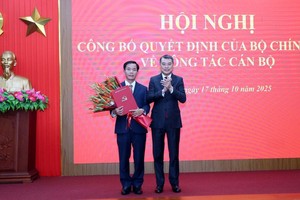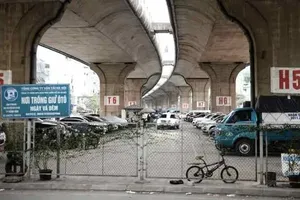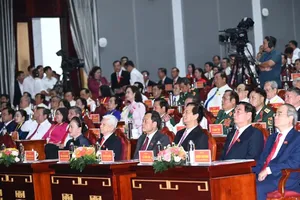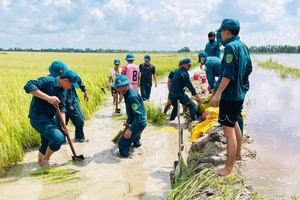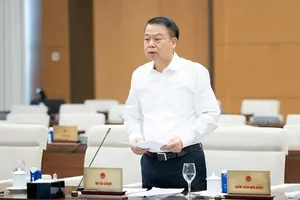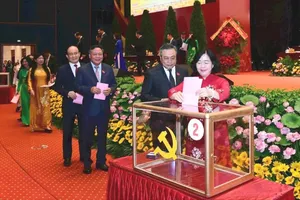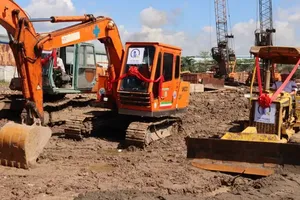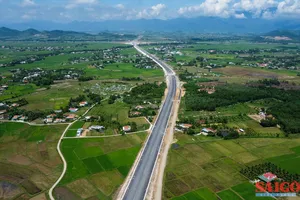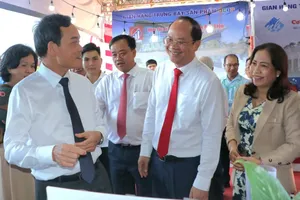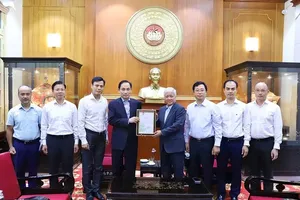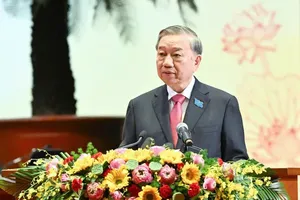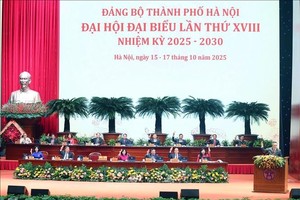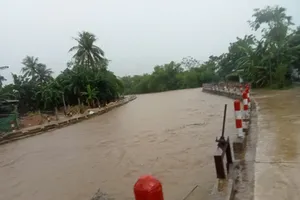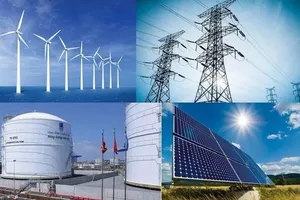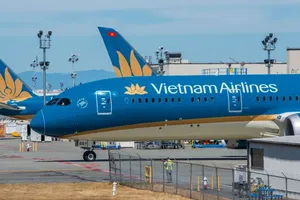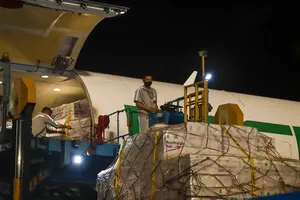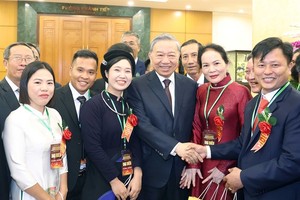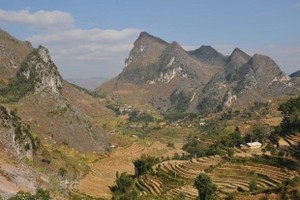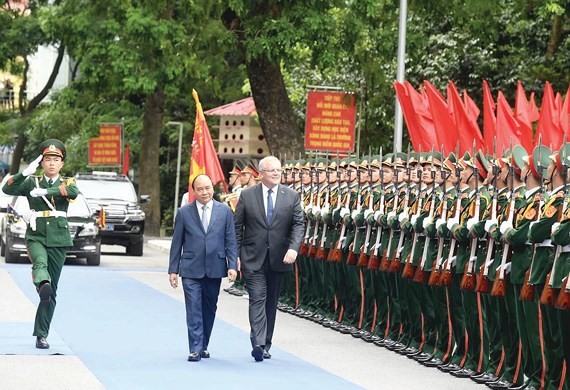
The consensus was reached during the talks in Hanoi between Prime Minister Nguyen Xuan Phuc and his Australian counterpart Scott Morrison, who is paying an official visit to Vietnam from August 22-24.
The two leaders said although Australia’s investment in Vietnam is remarkable, with nearly 500 projects and combined investment capital exceeding US$2 billion, the countries still hold a lot of potential and strength in this regard.
The two sides, therefore, concurred to build an enhanced economic engagement strategy with the aim of becoming top ten trade partners and doubling investment.
They will also push ahead with the first ministerial-level Vietnam-Australia economic partnership meeting to further boost the bilateral relations in trade, investment and development cooperation.
The sides will step up two-way connectivity, expand collaboration in energy security and seize digital opportunities, including digital economy and e-government.
PM Phuc hailed Australia to send a delegation of top businesses to Vietnam in 2020.
PM Morrison agreed to facilitate market access for Vietnamese aquatic and agricultural products, saying Australia is considering the import of Vietnamese live shrimp and fresh longan.
The leaders affirmed their support for the rules-based multilateral trading system and cooperation to promote regional economic integration through free trade agreements to which both countries are signatories such as the Agreement Establishing the ASEAN-Australia-New Zealand Free Trade Area and the Comprehensive and Progressive Agreement for Trans-Pacific Partnership (CPTPP), as well as cooperation in multilateral economic frameworks, including the Asia-Pacific Economic Cooperation (APEC) forum and the Asia-Europe Meeting (ASEM).
They noted with pleasure the strong, dynamic and effective development of the Vietnam-Australia relationship over the past time, saying the two countries hold substantial potential to strengthen their ties.
They spoke highly of the regular exchange of all-level delegations through all channels and consented to start the annual meeting mechanism of high-ranking leaders, while maintaining the meeting mechanisms at the foreign affairs, national defence and economic ministerial levels established within the strategic partnership.
The two sides took note of the effective and result-oriented cooperation in national defence and security, especially Australia’s assistance to Vietnam in joining United Nations peacekeeping operations.
The PMs are scheduled to engage in an exchange with Vietnamese peacekeeping forces being trained by the Australian side at the Military Medical University during PM Morrison’s visit.
PM Phuc suggested the two sides expand partnerships in potential spheres like defence industry, cyber security and training connectivity.
PM Morrison agreed to enhance bilateral security cooperation, covering navigation and cyber security, and join hands in fighting cross-border crimes, human trafficking and terrorism.
The leaders shared the view that people-to-people exchange has developed strongly thanks to progress in cooperation in education, culture, tourism, labour and sports.
PM Phuc welcomed Australia’s announcement that from September 2 this year, Australia will increase the number of Work and Holiday Maker visa places for Vietnamese nationals from 200 to 1,500.
They committed to cooperating in coping with climate change, reducing plastic waste and exploiting seafood sustainably.
Apart from bilateral ties, host and guest touched upon regional and international strategic and security issues.
Australia committed to extending strong support to Vietnam in assuming the role of the ASEAN Chair in 2020 and as non-permanent member of the UN Security Council in 2020-2021.
Meanwhile, PM Phuc said Vietnam backs Australia’s efforts to boost connectivity with ASEAN, expressing his hope that Australia will strengthen its cooperation with countries in the Mekong sub-region in areas such as connectivity, ICT, climate change adaptation and water resource management.
Regarding the East Sea, the PMs expressed serious concerns about developments in the East Sea, including land reclamation and militarisation of disputed features.
They also expressed concern about disruptive activities in relation to long-standing oil and gas projects in the East Sea.
The two leaders emphasised the importance of freedom of navigation and overflight, compliance with international law and maintaining a rules-based order.
They called on all parties to exercise self-restraint and avoid actions that may further complicate the situation.
They also reaffirmed the need for states to resolve disputes peacefully, without the threat or use of force in accordance with international law, particularly the 1982 United Nations Convention on the Law of the Sea (UNCLOS).
The Prime Ministers underscored the importance of UNCLOS dispute settlement mechanisms and called upon the parties to respect and implement the decisions rendered by these mechanisms.
They reiterated the importance of the full and effective implementation of the Declaration on the Conduct of Parties in the East Sea (DOC).
They called for any Code of Conduct between ASEAN and China to be fully consistent with international law, in particular UNCLOS.
PM Phuc said he believes that Morrison’s first official visit to Vietnam in his capacity as Prime Minister of Australia will significantly contribute to consolidating the friendship and developing the strategic partnership between the two countries.
PM Morrison lauded major achievements Vietnam has recorded in national construction and development which, he said, have helped to improve its role and position in the region and the world, especially within ASEAN and the UN.
Australia always attaches importance to enhancing relations with Vietnam – its key strategic partner in ASEAN and the region, he said.
Following the talks, the PMs witnessed the signing of five cooperation documents in the fields of e-Government, finance, human trafficking combat and aviation services.
They then co-chaired a press conference to announce outcomes of their talks.
The two leaders said although Australia’s investment in Vietnam is remarkable, with nearly 500 projects and combined investment capital exceeding US$2 billion, the countries still hold a lot of potential and strength in this regard.
The two sides, therefore, concurred to build an enhanced economic engagement strategy with the aim of becoming top ten trade partners and doubling investment.
They will also push ahead with the first ministerial-level Vietnam-Australia economic partnership meeting to further boost the bilateral relations in trade, investment and development cooperation.
The sides will step up two-way connectivity, expand collaboration in energy security and seize digital opportunities, including digital economy and e-government.
PM Phuc hailed Australia to send a delegation of top businesses to Vietnam in 2020.
PM Morrison agreed to facilitate market access for Vietnamese aquatic and agricultural products, saying Australia is considering the import of Vietnamese live shrimp and fresh longan.
The leaders affirmed their support for the rules-based multilateral trading system and cooperation to promote regional economic integration through free trade agreements to which both countries are signatories such as the Agreement Establishing the ASEAN-Australia-New Zealand Free Trade Area and the Comprehensive and Progressive Agreement for Trans-Pacific Partnership (CPTPP), as well as cooperation in multilateral economic frameworks, including the Asia-Pacific Economic Cooperation (APEC) forum and the Asia-Europe Meeting (ASEM).
They noted with pleasure the strong, dynamic and effective development of the Vietnam-Australia relationship over the past time, saying the two countries hold substantial potential to strengthen their ties.
They spoke highly of the regular exchange of all-level delegations through all channels and consented to start the annual meeting mechanism of high-ranking leaders, while maintaining the meeting mechanisms at the foreign affairs, national defence and economic ministerial levels established within the strategic partnership.
The two sides took note of the effective and result-oriented cooperation in national defence and security, especially Australia’s assistance to Vietnam in joining United Nations peacekeeping operations.
The PMs are scheduled to engage in an exchange with Vietnamese peacekeeping forces being trained by the Australian side at the Military Medical University during PM Morrison’s visit.
PM Phuc suggested the two sides expand partnerships in potential spheres like defence industry, cyber security and training connectivity.
PM Morrison agreed to enhance bilateral security cooperation, covering navigation and cyber security, and join hands in fighting cross-border crimes, human trafficking and terrorism.
The leaders shared the view that people-to-people exchange has developed strongly thanks to progress in cooperation in education, culture, tourism, labour and sports.
PM Phuc welcomed Australia’s announcement that from September 2 this year, Australia will increase the number of Work and Holiday Maker visa places for Vietnamese nationals from 200 to 1,500.
They committed to cooperating in coping with climate change, reducing plastic waste and exploiting seafood sustainably.
Apart from bilateral ties, host and guest touched upon regional and international strategic and security issues.
Australia committed to extending strong support to Vietnam in assuming the role of the ASEAN Chair in 2020 and as non-permanent member of the UN Security Council in 2020-2021.
Meanwhile, PM Phuc said Vietnam backs Australia’s efforts to boost connectivity with ASEAN, expressing his hope that Australia will strengthen its cooperation with countries in the Mekong sub-region in areas such as connectivity, ICT, climate change adaptation and water resource management.
Regarding the East Sea, the PMs expressed serious concerns about developments in the East Sea, including land reclamation and militarisation of disputed features.
They also expressed concern about disruptive activities in relation to long-standing oil and gas projects in the East Sea.
The two leaders emphasised the importance of freedom of navigation and overflight, compliance with international law and maintaining a rules-based order.
They called on all parties to exercise self-restraint and avoid actions that may further complicate the situation.
They also reaffirmed the need for states to resolve disputes peacefully, without the threat or use of force in accordance with international law, particularly the 1982 United Nations Convention on the Law of the Sea (UNCLOS).
The Prime Ministers underscored the importance of UNCLOS dispute settlement mechanisms and called upon the parties to respect and implement the decisions rendered by these mechanisms.
They reiterated the importance of the full and effective implementation of the Declaration on the Conduct of Parties in the East Sea (DOC).
They called for any Code of Conduct between ASEAN and China to be fully consistent with international law, in particular UNCLOS.
PM Phuc said he believes that Morrison’s first official visit to Vietnam in his capacity as Prime Minister of Australia will significantly contribute to consolidating the friendship and developing the strategic partnership between the two countries.
PM Morrison lauded major achievements Vietnam has recorded in national construction and development which, he said, have helped to improve its role and position in the region and the world, especially within ASEAN and the UN.
Australia always attaches importance to enhancing relations with Vietnam – its key strategic partner in ASEAN and the region, he said.
Following the talks, the PMs witnessed the signing of five cooperation documents in the fields of e-Government, finance, human trafficking combat and aviation services.
They then co-chaired a press conference to announce outcomes of their talks.
